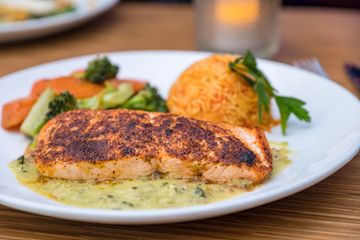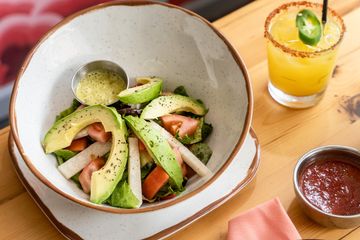Is Mexican Food Healthy? Unboxing the Nutritional Conveniences of Standard Ingredients
The concern of whether Mexican food is healthy welcomes an expedition of its standard ingredients. Beans and corn work as fundamental staples, abundant in protein and fiber. Avocados give helpful fats, while different natural herbs and seasonings add taste and health and wellness benefits - hand crafted margarita. Together, these elements create a tapestry of nourishment. The healthiness of Mexican food usually depends on prep work techniques and part dimensions. What duty do these elements play in determining its total nutritional worth?
The Power of Beans: Healthy Protein and Fiber-Rich Staples
Typically forgotten, beans offer as a cornerstone of Mexican cuisine, using a wide range of nutritional benefits. Rich in protein, they are an exceptional plant-based choice for those seeking to satisfy their nutritional healthy protein requires. This high protein content supports muscular tissue repair service and growth, making beans invaluable for both meat-eaters and vegetarians alike. Furthermore, beans are a phenomenal source of nutritional fiber, which assists in digestion and promotes a feeling of volume, possibly helping with weight management.
The range of beans utilized in Mexican meals, such as black beans, pinto beans, and kidney beans, adds to a diverse flavor profile and can enhance dishes nutritionally. Beans are low in fat and contain important vitamins and minerals, including magnesium, folate, and iron. With each other, these attributes make beans a vital component, supplying both nutrients and food in conventional Mexican price.

Corn: a Versatile Grain With Nutritional Perks
Corn stands apart as a versatile grain fundamental to Mexican food, celebrated not only for its cooking applications but additionally for its impressive dietary account. As a main ingredient in recipes like tortillas, tamales, and pozole, corn supplies necessary nutrients that add to a well balanced diet regimen. Rich in carbs, it functions as a substantial power resource, while additionally being low in fat, making it a beneficial choice for numerous dietary requirements.
Corn is a great resource of dietary fiber, which aids in digestion and advertises satiation. It contains considerable quantities of vitamins such as B-complex vitamins, which are important for power metabolism. The visibility of antioxidants, particularly carotenoids, adds to total wellness by reducing oxidative anxiety. Additionally, corn is gluten-free, accommodating those with gluten level of sensitivities. Generally, the dietary benefits of corn highlight its value in typical Mexican food and its function in a healthy and balanced diet.
Avocados: Healthy Fats and Nutrients in Every Bite
Avocados play a substantial role in Mexican food, enhancing meals with their velvety structure and rich flavor. Beyond their culinary appeal, avocados are celebrated for their impressive dietary account. They are an abundant source of healthy monounsaturated fats, which can help reduced negative cholesterol degrees and assistance heart health and wellness. Furthermore, avocados are loaded with necessary nutrients, consisting of potassium, vitamin E, and B vitamins, adding to general wellness.
The high fiber content in avocados aids digestion and promotes satiety, making them a valuable addition to any meal. Their special nutrient composition can likewise support skin wellness and provide anti-inflammatory benefits. Integrating avocados into conventional Mexican meals or enjoying them as a standalone snack can enhance both taste and nutrition, showing why they are a cherished staple in Mexican cuisine. Overall, avocados use a scrumptious means to delight in healthy and balanced fats and crucial nutrients in every bite.

Spices and Herbs: Flavorful Health And Wellness Boosters
While delighting in the rich tastes of Mexican cuisine, one can not neglect the important duty that spices and herbs play in boosting both preference and health. Components such as cilantro, oregano, and chili peppers not just contribute to the vibrant flavor profile however additionally provide considerable health and wellness advantages. Cilantro is recognized for its cleansing homes, aiding to get rid of hefty metals from the body, while oregano is loaded with anti-oxidants and possesses anti-inflammatory impacts.
Chili peppers, a staple in numerous Mexican meals, have capsaicin, which has actually been connected to boosted metabolic rate and pain alleviation. Furthermore, flavors like cumin and coriander support digestion and may assist in blood sugar level policy. Incorporating these flavorful health and wellness view boosters right into meals not just enhances the culinary experience but likewise advertises general health, making Mexican food not just tasty, however also nutritionally beneficial.
Traditional Food Preparation Approaches: Enhancing Nutrition and Flavor
Typical food preparation techniques in Mexican cuisine play an important role in enhancing both nourishment and flavor, as they typically prioritize fresh ingredients and time-honored strategies. Methods such as nixtamalization, where corn is soaked and prepared in an alkaline service, not just enhance the nutrient profile of tortillas yet likewise enhance their digestibility - churros. In addition, the use of slow-moving cooking approaches, like stewing or braising, permits tastes to meld wonderfully while preserving the integrity of the active ingredients

Regularly Asked Inquiries
Are Mexican Food Portions Generally Larger Than Other Cuisines?
Mexican food portions are frequently larger than those of many other foods. This particular reflects standard dining practices, stressing common sharing and hearty meals, which can bring about a much more substantial offering size overall.
Just how Does the Preparation Approach Affect Healthiness of Mexican Food?
Prep work approaches considerably influence the healthfulness of Mexican food. Methods such as grilling or steaming maintain nutrients, while frying can raise undesirable fat content. Selections of active ingredients and cooking styles inevitably establish general nutritional value.
Can Mexican Food Be Customized for Particular Dietary Restrictions?
Mexican food can certainly be tailored for details nutritional constraints. Alternatives, such as utilizing corn tortillas for gluten-free diet regimens or integrating more vegetables, enable people to enjoy typical tastes while accommodating numerous dietary needs.
What Prevail Misunderstandings Concerning Mexican Food and Health And Wellness?
Usual mistaken beliefs regarding Mexican food include the belief that it is inherently unhealthy, overly hot, and entirely concentrated on fats. In truth, traditional recipes commonly feature healthy ingredients and can be customized to different nutritional requirements.
Are There Much Healthier Options at Mexican Dining Establishments?
Healthier choices at Mexican dining establishments typically consist of smoked meats, beans, and fresh vegetables. Picking meals that highlight entire ingredients and staying clear of heavy sauces can result in a much more nourishing dining experience, promoting general health.
The variety of beans utilized in Mexican recipes, such as black beans, pinto beans, and kidney beans, adds to a varied taste account and can enhance meals nutritionally. Avocados play a substantial duty in Mexican food, complementing recipes with their creamy texture and abundant taste. Incorporating avocados right into typical Mexican recipes or appreciating them as a standalone treat can boost both taste and nourishment, showing why they are a cherished staple in Mexican food. While appreciating the abundant flavors of Mexican food, one can not overlook the important duty that spices and herbs play in enhancing both taste and health. Conventional food preparation techniques in Mexican cuisine play an essential role in improving try this website both nourishment and flavor, as they often focus on time-honored strategies and fresh components.